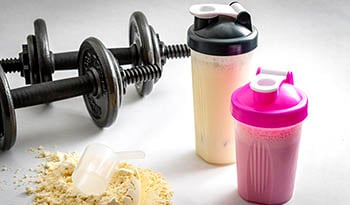Should You Supplement with Protein? Here are 3 Key Benefits
DISCLAIMER:This blog does not intend to provide diagnosis...
- In this article:
- The Health Benefits of Protein Powder
- 1. Weight Loss
- 2. Muscle Repair
- 3. Convenience
- Choosing the Right Protein Powder
- Avoiding Toxins in Protein Powder
- Choose Better Protein Powders for a Healthy Planet

Many athletes and people on weight-loss diets include some form of protein supplement on a daily basis, often in the form of powder. Protein powder is popular because it can be beneficial for those who want to lose weight, gain muscle, and improve athletic performance.
The problem with the majority of protein powders on the market is the same issue other packaged and processed foods have—an unsightly list of bad-for-you ingredients. Thankfully, there is a foundation that concerns itself with food safety and tests consumer products for harmful contaminants that not only negatively affect our health but the environment as well: the Clean Label Project.
The Health Benefits of Protein Powder
Protein is essential for building and repairing muscles, creating hormones, and overall enhancement of body energy. The fact that the body does not store protein like it does fat and carbohydrates is the reason why we need to be consuming the right amount on a consistent basis. Protein is available from a variety of sources, so even if you are vegan, there is no reason to skimp on this macronutrient.
If you generally eat a wholesome diet with the right servings from every food group, including protein sources, then you may not need to supplement. People who suffer from systemic problems that cause protein deficiency can benefit from supplementation as an easy way to increase daily intake. Even if you do not have a specific deficiency, adding a protein powder to your diet can prove beneficial for many reasons, including:
1. Weight Loss
Including protein at every meal may help you stay full for longer. Protein increases appetite-suppressing hormone levels and lowers the hunger-causing hormones, which means you are likely to eat less overall. This does not mean you should overload every meal with high amounts of protein, though. Studies have shown that satiety levels are similar whether you consume 20 grams or 80 grams of protein.
2. Muscle Repair
This is especially important for athletes, particularly bodybuilders and those who partake in endurance sports. It is a myth that a high-protein diet builds strength and muscle size—only exercise can do this. The increased protein intake for those looking to protect and repair their muscles will depend on the amount of nitrogen lost during activity. During these intense sports, a high-protein diet may help recover from muscle damage, since protein is the only macronutrient that contains nitrogen.
3. Convenience
It is much easier to whip up a breakfast smoothie than it is to cook scrambled eggs with a side of sausage. It is actually a much healthier option, too. Protein powder is also a quick addition to oatmeal to increase protein consumption. For those who travel often or are out working all day, premade protein shakes and protein bars are a convenient way to get in a meal and/or snack and will help steer you away from bad food choices.
Choosing the Right Protein Powder
Ideally, you want to get enough protein from sources that contain as many important amino acids as possible, but this can get a little tricky. Animal proteins, such as fish, steak, chicken, and eggs, generally have more complete ratios of the 20 essential amino acids than do plant-based protein sources. Although you can combine different plant foods in one meal to get a more complete ratio, this requires putting more thought into meal preparation. Many protein powders on the market contain the right blend of amino acids we need, which is why it may be an easier way to get the right amount of protein. But is this really the healthiest way to go?
The most popular type of protein powder is made of whey, which comes from milk. Since there is a large portion of the population that is intolerant to dairy and/or are vegan, other brands have come out with protein powders made with plant-based ingredients. The protein that supplies these options is usually hemp, pea, or rice. In order to get what we need from these powders in just one serving, while also enhancing the flavor, it is convenient for brands to add in a long list of other ingredients that may or may not be healthy at all.
Avoiding Toxins in Protein Powder
We already take in enough toxins from the environment from sources we cannot control, so why ingest more with what we eat? Unfortunately, many protein powders are made with a hefty list of ingredients, so if you are looking to include the cleanest option in your diet, you are going to have to read the label to find out what’s really inside the canister.
It is important to note that many packaged foods we consume do not make it clear on the labels that they contain any harmful additives. Why would they? It would only drive consumers away from purchasing their products. Artificial preservatives and synthetic fillers are often found in the tastiest of protein powders. Unfortunately, this is what lures us to keep buying them.
As more and more consumers are becoming aware of their health and what they put into their bodies, natural and organic protein powders are becoming more popular. People are less interested in flavor and more interested in protecting their health.
The worst of the worst, which are the heavy metals, bacteria, and pesticide contaminants, should be on the top of our list to avoid when supplementing with protein powder. It is a fact that many of these same contaminants are already part of our diets and environment, but the fact that many people consume protein powder supplements on a daily basis, and sometimes several times per day, is what is concerning.
Many brands refuse to have their products tested for harmful additives because they do not want it to affect their sales, but shouldn’t this be a priority? It’s not; therefore we need to be diligent in scoping out what’s on the market before consumption. Organizations like the Clean Label Project test a large number of consumer products and make consumers aware of what’s a good buy and what’s a bad buy. By “bad” they mean for your health, the environment, or both.
Choose Better Protein Powders for a Healthy Planet
Although there is debate about whether animal proteins are significantly worse for the environment than plant proteins, it is still a good idea to make food choices with not only our health in mind but also our planet. Many consumers opting for plant-based versions of protein powder are unaware of the harmful additives in most of these products. The Clean Label Project determined that several plant-based protein powders had significantly higher amounts of BPA, cadmium, and lead than animal powders such as whey. Powders made from egg were actually shown to be the cleanest option.
It’s safe to say organic products are generally cleaner than non-organic, but you should still check labels and research to truly know what’s really in your protein powder. The foundation’s testing concluded that many organic powders contained a higher amount of heavy metals and environmental contaminants, but this may be due to toxins present in the soil in which they are grown. This may also explain why whey and egg powders often have less harmful toxins than plant-based powders.
We should do what we can to be healthier human beings but also keep in mind that the way we behave and the food choices we make can greatly impact our planet. It may be hard to believe, but the majority of choices are actually easy ones. Those non-organic, less expensive protein powders may taste a bit better than the cleaner versions, but isn’t it better to sacrifice a little bit of flavor in order to protect our health and our planet? After all, isn’t the reason we are including these supplements in our daily diets in the first place to help improve our health?
References:
- “Clean Label Project Protein Powder Study Results 2018.” Clean Label Project, 2018, cleanlabelproject.org/.
- Lejeune, Manuela P G M, et al. “Ghrelin and Glucagon-like Peptide 1 Concentrations, 24-h Satiety, and Energy and Substrate Metabolism during a High-Protein Diet and Measured in a Respiration Chamber.” The American Journal of Clinical Nutrition, U.S. National Library of Medicine, Jan. 2006, www.ncbi.nlm.nih.gov/pubmed/16400055/.
- Tessari, Paolo, et al. “Essential Amino Acids: Master Regulators of Nutrition and Environmental Footprint?” Nature News, Nature Publishing Group, 25 May 2016, www.nature.com/articles/srep26074.




